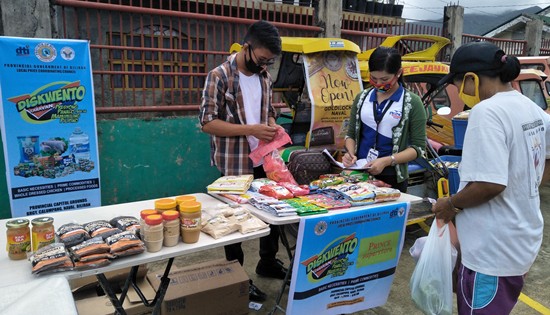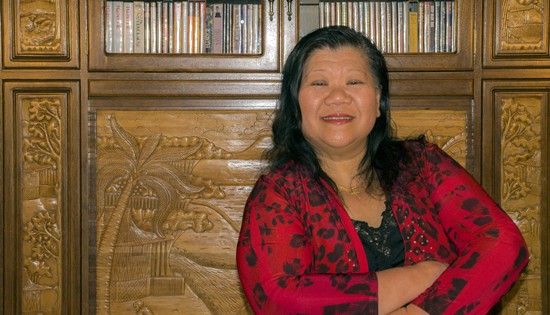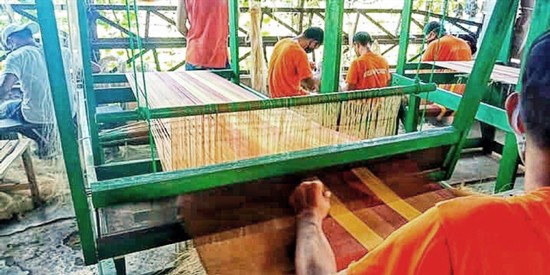‘Diskwento’
Caravan continues roll out in Eastern Visayas

By
DTI-ROG
May 26, 2020
MAKATI CITY –
Addressing the needs of consumers for accessible and affordable
basic necessities and prime commodities amid the COVID-19 crisis,
the ‘Diskwento’ Caravan of the Department of Trade and Industry
(DTI) has been continuously rolling out nationwide reaching even the
rural and marginalized areas.
In Eastern Visayas, the
rolling store has been catering more food among low-income families
in Biliran. To date, DTI has conducted fourteen (14) runs of
‘Diskwento’ Caravan since April 16, 2020 in the province.
The caravan is in support
and tie-up with the Office of the Provincial Agriculture Services (OPAS)
of the Biliran provincial local government, the Department of
Agriculture’s (DA), the Bureau of Fisheries and Aquatic Resources’ (BFAR)
“Kadiwa ni Ani at Kita” Project under the help of Governor Rogelio
Espina.
The products in the
‘Diskwento’ Caravan include instant noodles, coffee, canned
sardines, soap, condiments; locally produced food products such as
salted egg, ground robusta coffee, ginger tea/ salabat, tumeric,
tablea, peanut butter, peanut brittle, papaya pickles, dressed
chicken; and other available agri-fishery products like fresh fish,
pork, vegetables and fruits.
The ‘Diskwento’ Caravan
was seen to be effective and efficient for both sellers and market
goers. The 14 runs have served twenty-five (25) Barangays or a total
of seven hundred ninety-three (793) households in the Municipalities
of Naval, Cabucgayan, and Maripipi.
Suppliers of Basic
Necessities and Prime Commodities (BNPC) that were invited by DTI in
Biliran generated total sales of P302,222.00. This serves also a
good avenue for local distributors and suppliers to reach their
target market and beef up sales from the drop due to the limited
mobility of buyers.
“DTI will be in its
forefront conducting more ‘Diskwento’ Caravans in other
municipalities together with their LGU agricultural offices and the
DA, to continually serve the masses while the province of Biliran is
under a General Community Quarantine (GCQ),” said OIC Provincial
Director Faustino V. Gayas, Jr.
DPWH completes
flood control along Oquendo Bridge

By
CHENZI MAY D. UY
May 26, 2020
CALBAYOG CITY – The
Department of Public Works and Highways has completed another flood
control structure along Oquendo Creek to support the abutment of
Oquendo Bridge, which runs via Lope de Vega route.
The structure is
320-linear-meters long and stands at a height of 2.66 meters.
Flood control management
is essential to protect the bridge from flood damage as well as to
preserve the riverbanks from erosion. Consequently, the flood
control structure also keeps the creek’s floodwaters away from the
people who have settled in the floodplain areas.
Oquendo Creek streams into
the Jibatang River, one of the two major river systems in the Samar
I district. According to Barangay Captain Jaime Y. Hernandez,
flooding is a perpetual problem in their village particularly in
areas near these bodies of water. A heavy rainfall event is enough
to overtop the creek and cause flooding.
The completed project has
an allotment of 45 million pesos from the General Appropriations Act
(GAA) 2019.
DTI pushes for
immediate passage of stimulus package to mitigate COVID-19 fallout
By
DTI-OSEC-PRU
May 25, 2020
MAKATI CITY – The
Department of Trade and Industry (DTI) is seeking the urgent passage
of the proposed Philippine Economic Stimulus Act of 2020 (PESA),
which aims to provide immediate assistance to workers and businesses
and help the economy recover from the impact of the COVID-19
pandemic.
“We affirm the need to
help sustain the income of workers and businesses adversely impacted
by the pandemic as we gradually reopen our economy,” Trade Secretary
Ramon Lopez said.
“By providing working
capital assistance, technical and entrepreneurial education, and
financial management, among others, we will be able to protect
Filipinos by ensuring businesses will continue operating
post-lockdown and help turn the tide for businesses and workers
affected by the health crisis,” he added.
Under the PESA bill, the
government will earmark Php1.3 trillion as a post-pandemic stimulus
package, which includes a budget of P650 billion for an expanded
infrastructure program on health care, education, and food security.
The proposed law will also
allot: P300 billion for the National Emergency and Investment Corp.,
which seeks to “minimize the damage” wrought by COVID-19 to the
economy; P200 billion for wage subsidies and the grant of
interest-free loans to assist micro, small and medium enterprises (MSMEs),
including businesses labeled “non-essential” during the lockdown; as
well as P128 billion for the Credit Mediation and Restructuring
Guarantee Fund, an expanded loan program that will cover all
“critically-impacted businesses” nationwide, among others.
The bill is aimed at
restoring business confidence and operations, as well as preventing
business closure prior to the imposition of the Enhanced Community
Quarantine (ECQ). It has also been the subject of many consultations
and hearings under the Committees on Economic Affairs under
Chairperson Sharon Garin and Trade and Industry under Chairman Wes
Gatchalian, which consolidates the proposals of Albay 2nd District
Rep. Joey Salceda and Marikina Rep. Stella Luz Quimbo.
The trade chief expressed
his thanks to the House of Representatives led by Speaker Alan Peter
Cayetano and Majority Leader Martin Romualdez for their strong
support to revive the economy.
“Businesses have already
lost a significant amount of income due to the challenges in
logistics brought about by the ECQ,” Sec. Lopez said.
He explained, “As we work
towards the gradual lifting of the quarantine, more businesses will
be able to operate, but at lower capacities due to limited capital
resources that dwindled during the quarantine period. There are also
strict health measures that are being imposed and the firms would
need working capital loans.”
“At a very critical time
such as this, we must not only ensure a safe working environment for
our citizens, but also continue to find means to support, and more
importantly save the jobs of those adversely affected to facilitate
faster economic recovery,” Sec. Lopez added.
FLETC focus with
Dr. Ruth Simmons: Spotlighting Asian-American Pacific Islander
Heritage Month and FLETC’s 50th Year
By
JENNIFER SCALES
May 19, 2020
GLYNCO, GA – The
Federal Law Enforcement Training Centers (FLETC) salutes
Asian-American and Pacific Islander Heritage Month (AAPIHM) through
a series of articles recognizing FLETC staff of Asian and Pacific
Island descent. The AAPIHM national campaign theme “Unite Our Nation
by Empowering Equality” reminds us that we are stronger together;
united by our common ties and better collectively because of our
distinct experiences. Our first focus article shines a light on Dr.
Ruth Simmons, Senior Program Analyst in Artesia, New Mexico.
Dr. Simmons is no stranger to public service. Born to Mabini and
Teodora in Angono, Rizal, The Philippines, the family relocated to
San Diego when Simmons was an infant after her father, a U.S. Navy
member, received reassignment orders.
“Both of my parents were hardworking, industrious, innovative, and
they valued education and learning,” says Simmons. “My Dad always
told us when we were growing up that no one is ever too old to
learn. And to this day, I love and welcome learning new things and
new ideas.”
Selected as FLETC’s first physician assistant in 1995, Dr. Simmons
recalls wanting to be a part of the organization where most in the
federal law enforcement field receive their training prior to being
deployed to the field. Dr. Simmons has served in a variety of
positions since her tenure at FLETC began, including Branch Chief,
Assets Management Branch; Management Analyst; Administrative
Property Specialist; Supply Management Specialist and Physician
Assistant/Acting Medical Officer in Charge.
Dr. Simmons is an impactful and innovative employee, and many of her
ideas have enhanced FLETC processes. “We used to have to write down
by hand the “SOAPs” (Subjective, Objective/Physical Findings,
Assessment and Plan) for each patient that we saw in the Health
Unit,” Simmons says. With her suggestions, an electronic medical
record created in collaboration with Information Technology (IT) is
now in use. Another suggestion made by Dr. Simmons to track injury
trends now impacts training by focusing on injury prevention. This
was done in collaboration with the Research and Evaluation Division,
the FLETC athletic trainers and the Office of Workers Compensation
Program (OWCP) Specialist in the Human Capital Office. Another
suggestion adopted by FLETC was Dr. Simmons’ idea to form a Medical
Review Board to evaluate and decide students’ medical ability to
continue or discontinue training.
Suggestions and ideas come to Simmons as second nature now. “I love
looking at various processes, analyzing and researching where I can
make it better,” Simmons says. “I thrive in being innovative and
relish the creativity that comes with it.”
As FLETC approaches its 50th anniversary, Dr. Simmons foresees
bright days ahead for our organization. “FLETC has always been, and
I firmly believe, it will always be, in the forefront when it comes
to law enforcement training which is its mission, because we don’t
rest on our laurels and get complacent,” Simmons says. “We keep on
seeking higher sights and moving to higher ground so we can be the
best there is in the world. There are a lot of innovative changes
ahead of us especially in the field of information technology and
artificial intelligence and we will always be the best as we remain
adaptable, agile, flexible, innovative, resilient and open minded
with the willingness to embrace change to make us better.”
Simmons concludes, “FLETC is a place where there are great people, a
great environment, opportunities for career growth…it’s just the
best Law Enforcement Training Centers in the world.”
|

Sharing
a smile and good vibes for Asian-American and Pacific
Islander Heritage Month, Dr. Ruth Simmons, Senior Program
Analyst for the Federal Law Enforcement Training Centers in
Artesia, New Mexico, from her home. (Photo by Ben Briones,
Jr.) |
DTI helps
prisoners and IPs sustain livelihood adaptable to the pandemic

By
DTI-ROG
May 18, 2020
MAKATI CITY –
Helping the micro, small and medium enterprises (MSMEs) cope with
the prolonged economic slowdown brought about by the COVID-19
lockdown, the Department of Trade and Industry (DTI), through its
Regional Operations Group (ROG) spearheaded by Undersecretary
Blesila Lantayona, has been dynamic and responsive to the needs of
the sector equipping them to venture into opportunities fit in the
pandemic crisis.
Consequently, DTI-Davao
del Norte introduced to Gleizl Joy Cabahug Soo of Modishchey
Creations the idea of producing reusable and fashionable face masks
made of banana fibers. This is part of the office’s assistance to
the company to sustain its business operation and to provide
employment amid the constraints brought by the current situation.
Modishchey Creations came
up with a line of fashion pieces using the banana fiber woven
textile. This fiber is called “musa” that derives from the
scientific name of banana. Using the musa fabric as the main
material of the textile, Soo incorporated her creation with a
sustainable textile produced by Davao del Norte’s Indigenous People
(IP) women weavers as well as the prisoners or people deprived of
liberty (PDLs. These banana fiber woven textiles are the output of
DTI’s initiative last year, the training on banana fiber weaving
among the IPs and the prisoners.
DTI has noted the primary
aim of this project, which is to promote sustainable livelihood for
the IPs especially among the prisoners who have no means of
providing for their families.
Within a short period
after its introduction to the market on May 8, 2020, a total of 60
pieces were already sold. Aside from this, Soo received an order of
1,000 pieces from Visayas and as far as the United States.
Soo’s new product line has
initially provided jobs to seven tailors and 20 weavers. It is also
expected to expand and generate more income for them as the musa
fabric is keen on widening its market.
Meanwhile, DTI-Davao del
Norte is committed to continue its support to the project, which is
being seen to sustain the banana fiber production through the
Department’s Shared Service Facility (SSF) program as well. Weavers
in six communities in the different municipalities of Davao del
Norte were already trained. They are now ready to be tapped whenever
there is an increase in the volume requirement.
Apart from the face masks,
Modishchey Creations has also created washable bags and fashion
dresses featured during the 22nd Araw ng Tagum and the 10th
Anniversary of the Fashion Designers Alliance of the Philippines in
Taguig City. Further, with the encouragement of DTI, Soo filed its
trademark application for MUSA Fabric last February 21.
The province of Davao del
Norte is known as the “Banana Capital of the Philippines” since it
is home to several major banana plantations and small producers. In
fact, the industry is driving the export performance of the
province. With the banana textile face masks and other MUSA Fabric
products, the industry is surely adding more value, especially with
the introduction of post-Corona Fashion. Moreover, it will also give
an opportunity for additional income among weavers, designers and
MSMEs.
DOLE RO8 assists
12,901 private workers through CAMP
By
NORMA RAE S. COSTIMIANO
May 15, 2020
TACLOBAN CITY –
Under its CoViD-19 Adjustment Measures Program (CAMP), the
Department of Labor and Employment Regional Office VIII has provided
P5,000.00 financial aid to 12,901 workers of some 915 private
establishments in Eastern Visayas affected by the CoViD-19 pandemic,
with a total assistance amounting to P64,505,000.00.
Of the total approved and
paid establishments, 712 have resorted to temporary closure,
displacing 8,883 workers while the remaining 203 establishments have
implemented flexible work arrangements affecting 4,018 employees.
The one-time financial
assistance was received by the beneficiaries through the M Lhuilier
remittance center nearest them.
Breaking down the regional
accomplishments, Northern Leyte Field Office, where the highly
urbanized city of Tacloban is located, got the biggest share of the
CAMP funds at 34% equivalent to P21,970,000 benefiting 4,394 workers
from 291 firms. Ranking second is the Samar Field Office with 17%
equivalent to P10,925,000.00 benefiting 2,185 employees of 120
establishments mostly located in Catbalogan City and Calbayog City.
Following closely were the
West Leyte and Southern Leyte Field Offices, having 1,934 and 1,827
beneficiaries which translates to fund disbursements of
P9,670,000.00 and P9,135,000.00, respectively.
Meanwhile, the remaining
three field offices had their fare share considering the fewer
establishments located thereat. Biliran Field Office was able to
assist 1,117 workers equivalent to fund disbursement of
P5,585,000.00 while the Northern Samar Field Office disbursed a
total of P4,480,000.00 for the benefit of 896 affected workers.
Eastern Samar Field Offices had the smallest share with
P2,740,000.00, benefitting some 548 affected workers.
With the suspension of
CAMP due to depleted funds, Regional Director Yahya A. Centi said
that DOLE has done its best effort to extend help to the needy
workers of the region displaced by the CoViD-19 crisis.
“We at DOLE have done the
best way possible we can to extend assistance to our private workers
through the CAMP. Although we were not able to accommodate all
applicants due to lack of funds, we are happy serving the people of
Region VIII”, said Centi.
CAMP is DOLE’s safety net
program for the formal sector which provides a one-time financial
assistance of Five Thousand Pesos (P5,000.00) to workers in private
establishments who experienced loss or reduction of income due to
implementation of Temporary Closure or Flexible Work Arrangements (FWA)
during the COVID19 outbreak.
|

MAALSAD
Farmer Irrigators Service Cooperative (FISCO) chairman,
Reynaldo Peja, said that aside from the quarantine
accreditation pass, the hauling truck provided by the
Department of Agrarian Reform (DAR) is of big help to their
organization as they continue to deliver milled-rice during
the lockdown. (Photo courtesy of Roberto Cajipe) |
Agrarian reform
beneficiary organizations provide critical food supplies to
hospital, jail
By
JOHN COLASITO
May 14, 2020
TACLOBAN CITY – OIC-Regional
Director Ismael Aya-ay of the Department of Agrarian Reform (DAR)
was happy to know that the agency-issued quarantine accreditation
pass helped the marketing activities of the agrarian reform
beneficiaries organizations (ARBOs) in Eastern Visayas survive
amidst the lockdown prevailing in the country due to the coronavirus
disease 2019 (COVID-19) pandemic.
In the province of Leyte,
two DAR-assisted farmer organizations continue to provide critical
food supplies to government institutions.
Leyte-Biliran Provincial
Agrarian Reform Program Officer II, Renato Badilla, disclosed that
the MAALSADA Farmer Irrigators Service Cooperative (FISCO) continues
to deliver over 6,000 kilos of milled-rice to the Eastern Visayas
Regional Medical Center (EVRMC) in this city despite the lockdown.
MAALSADA FISCO, situated
in remote Sitio Amanantas of Barangay Dapdap in Alangalang town, is
a farmer organization supported by the DAR.
On the other hand, Badilla
added, another DAR-assisted farmer organization, the Paglaum Farmers
Association (PFA), likewise sustains to supply some 3,000 kilos of
assorted vegetables to the Bureau of Jail Management and Penology (BJMP),
also in this city, despite the current situation.
PFA is based in an upland
village in this city some 15 kilometers away from the downtown area.
Both organizations are part of a separate marketing tie-up
arrangements facilitated by DAR under the Enhanced Partnership
Against Hunger and Poverty program (EPAHP).
According to Badilla,
under the marketing tie-up arrangements, EVRMC and BJMP will buy
milled rice, vegetables, fruits and other farm products which they
will use in feeding patients, and persons deprived of liberty (PDL),
respectively, from the two-mentioned ARBOs.
As assistance extended by
the office to the two ARBOs during this hard and trying times,
Badilla added that they were among those provided with the
DAR-issued quarantine accreditation pass which was authorized by the
inter Agency Task Force for the Management of Emerging Infectious
Disease (IATF-EID) based on Resolution No. 19, dated April 3, 2020,
to allow agrarian reform beneficiaries (ARBs) the continuous supply
of agricultural products to critical areas affected by the enhanced
community quarantine.
Meanwhile, MAALSADA FISCO
chairman, Reynaldo Peja, shared that aside from the quarantine
accreditation pass, the hauling truck provided by DAR to their
organization, which is into rice trading business, is also of big
help to them.
Global human
rights group decries massacre of five Filipino farmers amid pandemic
Philippines still plagued
by killings and arrests of food producers
Press Release
May 14, 2020
MANILA – “It alarms
us that even Filipino farmers, who are food security front liners in
a country barely winning the battle against the COVID-19, have
become targets of the Philippine government’s more brutal
crackdown,” says Peter Murphy, Chairperson of the International
Coalition for Human Rights in the Philippines (ICHRP).
In a statement, ICHRP, a
global network of human rights advocates, has strongly condemned the
killing of farmers in this time of the pandemic. On top of the
already slumped agriculture and distressed food producers, the
relentless killings and attacks have wreaked fear in the country’s
rural areas.
The farmers slain by state
forces were identified as Jeric Vuno, Jerry Palanca, Robert
Villafuerte, Raymundo Tańada, and Jaime Tańada residents of Dolos
village in Bulan, Sorsogon province, 600 kilometres south of Manila.
According to local reports, the victims were forcibly taken from
their homes and executed at around 5 am on the morning of May 8.
The massacre was denied by
the Philippine authorities, who instead claimed that the farmers
were rebels. However, reports say that it was the Armed Forces of
the Philippines (AFP) and the Philippine National Police (PNP) who
arrived that day and summarily executed the residents including
Robert Villafuerte, who according to locals, suffers from a mental
health problem.
Neighboring residents were
also harassed and beaten up by the armed authorities which resulted
in physical injuries. The victims were Alvin Abuyog, Randy Golimlim,
Marissa Estiller, and her two children.
Another, more recent case
is the illegal arrest of farmers in Calaca, in the province of
Batangas early morning of May 10 by a joint police and military
operation. According to sugar workers and members of the Samahan ng
mga Magsasaka sa Coral ni Lopez (Organisation of Farmers in Coral ni
Lopez-SAMACOLO), the seized victims were Virgilio Vidal, Marcelo
Vidal, July Julongbayan, Leovino Julongbayan, Doroteo Bautista and
Roilan Tenorio. The farmers’ group said that they were illegally
arrested and that the arresting team forcibly entered the houses and
planted guns, ammunition, and explosives. Local residents said that
some of those arrested are their village officials and had been
facilitating the distribution of cash aid a day before the incident.
The global human rights
group has condemned President Duterte for using the COVID-19 as an
occasion if not an excuse to further his aims to implement de facto
martial law throughout the country. ICHRP highlighted the comment of
the UN High Commissioner for Human Rights, Michelle Bachelet that
the Philippines’ “highly militarised response” to the pandemic had
led to the arrest of more than 120,000 people including activists
leading relief efforts.
“It is but heartbreaking
and ironic that the killings and abuses continue at a time when we
are trying to save lives from the lethal coronavirus,” says ICHRP.
The government’s counterinsurgency operations in rural areas have
been non-stop despite UN Secretary-General António Guterres’
reiteration for a global ceasefire. With the massacre in Sorsogon
and the recent arrests in Batangas, food producers and rural folks
have become the collateral damage. Since Duterte became president,
there have been nearly 250 political killings of farmers.
“We call on our
international colleagues to press for the accountability of state
forces in the killings, arrests and other human rights violations in
the Philippines,” ICHRP concluded.
1 NPA terrorist
killed, M16 rifle and explosives seized in Pinabacdao, Samar
By
DPAO, 8ID PA
May 13, 2020
CAMP LUKBAN, Catbalogan,
Samar – Retooled Community Support Program (RCSP) Team of the
46th Infantry (Peacemakers) Battalion, Philippine Army encountered
not less than five (5) CPP-NPA Terrorists (CNTs) in Barangay Layo,
Pinabacdao, Samar today, May 13, 2020 at about 10:30 in the morning.
The encounter ensued when government security forces responded to an
information provided by the locals on the presence of an armed group
conducting extortion activities.
 After a 10-minute
firefight, the rebels retreated leaving behind their dead comrade
with one M16 rifle w/ attached M203 Grenade Launcher; one Improvised
Explosive Device (IED) approximately weighing 5 kilograms; one
blasting cap; one bandolier with one long magazine for M16 rifle
loaded with 10 rounds ammunition; two rounds of ammunition for M203
Grenade Launcher and ammunition for AK47. There was no casualty on
the government side.
After a 10-minute
firefight, the rebels retreated leaving behind their dead comrade
with one M16 rifle w/ attached M203 Grenade Launcher; one Improvised
Explosive Device (IED) approximately weighing 5 kilograms; one
blasting cap; one bandolier with one long magazine for M16 rifle
loaded with 10 rounds ammunition; two rounds of ammunition for M203
Grenade Launcher and ammunition for AK47. There was no casualty on
the government side.
Lieutenant Colonel Rhomel
R. Langcauon, Commanding Officer of 46IB, lauded the RCSP Team for
their efforts and the residents for providing the Army with timely
and vital information that led to the successful security operation.
Colonel Camilo Z. Ligayo,
801st Brigade Commander, in his statement, “This is a display of the
intensified support of local communities to the government,
denouncing the atrocities and activities of the rebel-terrorists. It
is a tragedy that another rebel loses his life as a victim of this
senseless armed struggle in an attempt to defend a futile ideology.
If they only considered the call to return to mainstream society,
unnecessary deaths in encounters like this would have never
occurred.”
Arrest of teacher
over online post, an overkill, shows selective law enforcement
ACT Press Release
May 13, 2020
QUEZON CITY - The
Alliance of Concerned Teachers (ACT) Philippines denounced the
arrest of public school teacher Ronnel Mas due to an allegedly
seditious social media post against the President, which the group
argued did not merit such harsh measures from the NBI owing to the
clear improbability of the alleged threat in the assailed post. In
the now deleted tweet, Mas offered a P50 million bounty for anyone
who will kill President Duterte.
"Teachers' dire economic
state is no secret to the people, especially to the government.
25-year old Teacher Ronnel obviously does not have P50 million to
pay as bounty hence his post clearly does not pose any serious
threat to the President. Why then did the NBI spend valuable time
and resources to apprehend this teacher?" raised ACT Secretary
General Raymond Basilio.
Mas is a Social Studies
teacher in Taltal National High School, Zambales and was awarded 3rd
place as 2019 Outstanding Secondary Teacher in the province.
ACT noted Mas to be the
3rd teacher who was arrested during the quarantine period for airing
out their disappointments and frustrations over the government's
faulty response to the COVID-19 crisis.
More baffling for the
teachers' federation is the prevalence of even more violent and
disturbing posts and pronouncements by Duterte supporters and even
government officials against critics of the administration which had
not been met with the same aggressive response from law enforcers.
The group cited the President's various official media pressers
where he called on authorities to commit murder and rape, among
others, against critics, oppositions, and anyone else deemed as
enemies of the administration. This is later echoed by online trolls
as well as by officials like DFA Secretary Teddy Locsin, Jr. who was
recently in hot waters for saying that the Bagong Alyansang
Makabayan (BAYAN) shall be shot to death as he alleged the group to
be communists.
"It is therefore clear
that this is not a matter of implementing the law down to the last
letter, but a selective imposition depending on the powers-that-be's
prerogatives. It is an issue of repression and punitive actions
against dissenters and sentiments that may be seen as
'anti-government.' This is an attack on free speech, on democracy.
This is an attempt to sow fear among the people, to dissuade them to
speak up about their situation and convictions," criticized Basilio.
ACT further lambasted the
government for its 'consistent weaponization of the law' to silence
critics while launching a 'massive disinformation campaign.' Such
widespread malpractice of state forces earns them a new title – from
law enforcers to law abusers.
"We call on fellow
defenders of democracy to resist all attempts to trample on our
rights and freedoms. Free Teacher Ronnel!" called Basilio.
Mas is the fifth teacher
to have been accosted during the enhanced community quarantine. The
first ones were Teachers Juliet and Eli Espińosa of General Santos
City, followed by Teacher Dale Gregory Medins on Las Pińas City,
then Teacher Edison Carsera of Norzagaray.